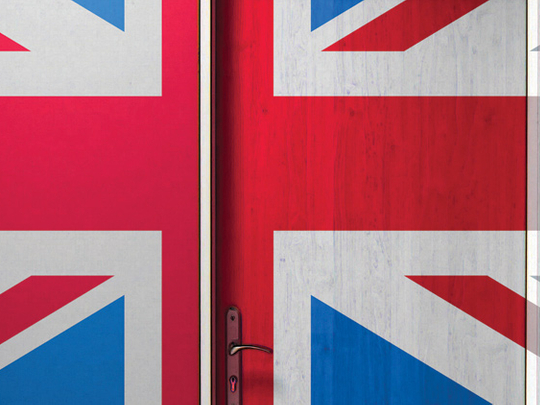
The other day, Britain’s Prime Minister David Cameron joined a police raid on the home of some suspected illegal immigrants. The television images — the essential point of the whole exercise — were telling. Cameron once cast himself as a moderniser. A memorable photocall saw him hugging a husky on melting Arctic ice to show that Tories too were worried about climate change. Now he wants to showcase how tough he is about curbing immigration.
The general election is less than a year away. Cameron is leaning right in the hope of seeing off the threat to his party from the anti-immigrant UK Independence party. It may also be that his earlier enthusiasm for “detoxifying” the Tory brand was simply a piece of political opportunism in keeping with the temper of more prosperous and generous times. Either way, the Conservatives now wear the “nasty party” label as a badge of honour.
Something has gone awry in British politics. There used to be a rule that elections were decided by swing voters camped in the centre ground. That is why they were called swing voters. This time, the Tories and Ed Miliband’s Labour party are playing the ideological tunes of their core supporters. Neither leader has what you may call a governing prospectus for the next five years. His time in Downing Street has cemented Cameron’s reputation as a man without a mission. Miliband thinks he can get by with a series of headline-grabbing swipes at predatory capitalism.
The two leaders have gone in search of enemies. For the Tories, appeasing the base means threatening to take Britain out of the European Union (EU) and labelling hard-working immigrants as welfare scroungers. Voters should forget all that save-the-planet nonsense. For Labour, it means dumping the centrism that won Tony Blair three elections in favour of lining up the wealthy and big business against a wall. United Kingdom is left with an unhappy choice of populisms: Anti-foreigner on the right, anti-capitalist on the left. The absence of unifying visions for the country may also explain the other oddity about this particular election. Neither side is confident of winning. Britain has had plenty of close-run polls. Mostly, though, one party or the other — and sometimes both — starts off convinced of victory. This time around, it is different. As optimistic as they sound in public, senior figures on both sides are privately distinctly hesitant about their prospects.
Pundits and pollsters are vexed. Psephology (arithmetic by its fancy name) says Miliband should grab the keys of Downing Street. Political intuition screams that the prime minister is sure of a second term. One point of convergence is that Nick Clegg’s Liberal Democrats, the junior partner in Cameron’s coalition, can expect a drubbing. There is an unfair irony in this. The third party’s claim for support rests on its role as a restraint on the ideological excesses of the big two. Many Lib Dem supporters instead treat Clegg as a collaborator.
To re-emerge as the leader of the largest party, Cameron has to win roughly the same share of the vote — 36 per cent — in 2015 as he did in 2010. This would be a challenge under any circumstances: Governments usually lose market share during a first term. Cameron must defy this precedent in the wake of the sharpest fall in living standards in recent memory. He also has Ukip to contend with. Its share of the vote will doubtless tumble from the giddy 27 per cent it won in this year’s European elections. But even, say, 8 or 9 per cent will cut disproportionately into Tory support. The prime minister’s mistake is to think he can play Ukip at its own xenophobic game. The Conservatives badly need the votes of more women and ethnic minorities. Breaking down the front doors of immigrants is not the way to win them over.
Miliband’s arithmetical advantage resides in a kink in the electoral system. Winning just 33 per cent of the vote could put him into Downing Street as leader of the largest party; two or three points more and he could expect an overall majority. Even at its 2010 nadir, Labour managed to secure 29 per cent; and in 2015, it can expect to be the big beneficiary of a fall in the Lib Dem vote. Miliband in other words has a 10-metre start in a 100-metre race.
Arithmetic, though, takes you only so far. Much as they have resented austerity, Britain’s voters show no appetite for a left-wing menu that would lead to higher spending, taxes and borrowing. Economic recovery has given the Tories a seemingly impregnable lead when it comes to perceptions of economic competence. Cameron has opened a similar gap on the question of leadership. His policy ambition may be stunted, but he plays the prime ministerial part skilfully enough. In contrast, the geeky Miliband’s presentational shortcomings — he admitted to them only the other day — are thrown into relief by the absence of a persuasive programme. So he should not be surprised when an on-camera wrestling match with a bacon sandwich makes the news.
It would be nice to say that none of this matters too much. The odds are that the result will be inconclusive and, one way or another, circumstance will constrain the populism of right or left.
The snag is that this election may well be more consequential than most. An outright Conservative victory could see Britain stumbling out of the EU. And the country really cannot afford a Labour economic strategy that mimics the mistakes of Francois Hollande’s French Socialists.
— Financial Times









